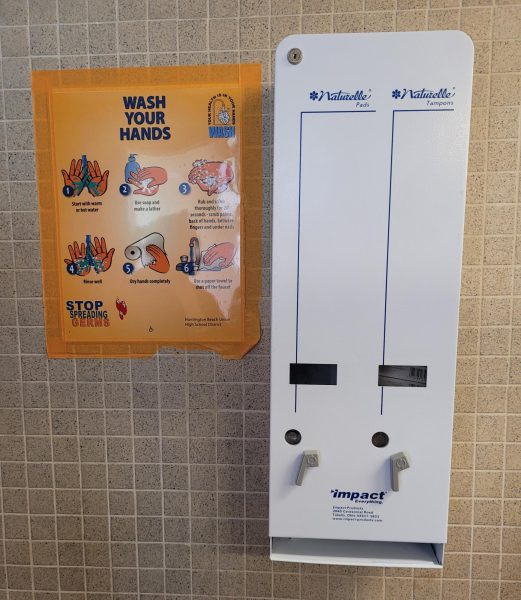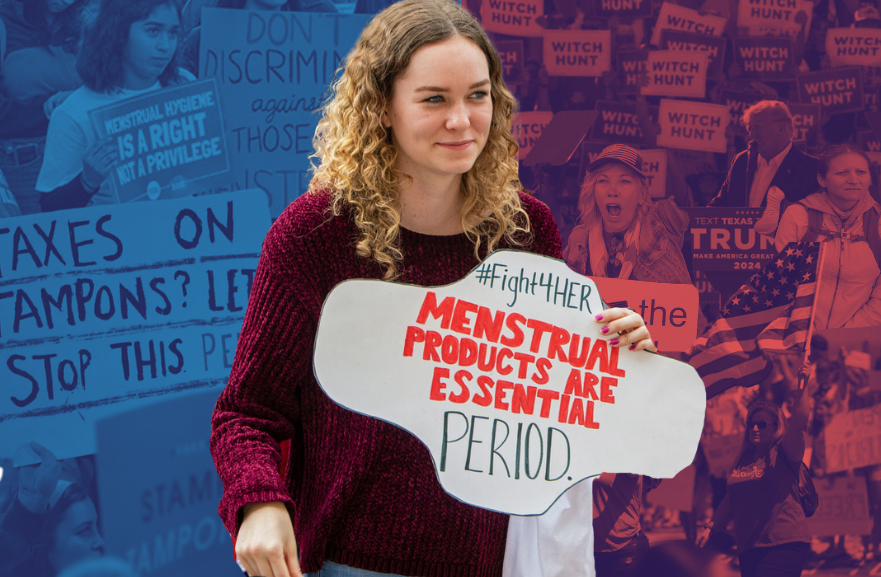At any given point, 800 million people are menstruating around the world and must have access to proper menstrual hygiene products.

Female students attending Huntington Beach High School (HBHS), an institution meant to empower young adults, face gender-based discrimination regularly via menstrual inequity. Earlier this year, HBHS installed free pad and tampon dispensers in all girls’ restrooms on campus.
This was a result of Congresswomen Cristina Garcia’s 2021 Assembly Bill No. 367, which said, “A public school maintaining any combination of classes from grade six to grade 12… [must] stock 50% of the school’s restrooms with feminine hygiene products, and prohibits a public school from charging for any menstrual products provided to pupils.”
While Huntington Beach High School may have product dispensers now, AB 367 was meant to be enacted—at the latest—by the 2022-23 school year, putting HBHS behind the significant curve. And, while the pad and tampon dispensers have been installed, the maintenance team fails to regularly stock the hygiene products and repair the broken machines.
A study we conducted in February reveals that for three consecutive weeks, 29% of the machines were stocked with pads but not functioning, while 71% weren’t stocked at all. Availability for tampons produced the same result, except for one stocked machine. However, the remaining tampons in it were used by students in a matter of two days.

Funding isn’t holding HBHS back either, despite menstrual hygiene products costing the average woman $240 per year. With AB 367 being state-mandated, Garcia said, “The California Constitution requires the state to reimburse local agencies and school districts for certain costs mandated by the state.”
HBHS sophomore Stephanie Dahabreh expressed her frustration and said, “The [machines] don’t even work half the time. I just wish they fixed them because sometimes I need a pad, and it’s broken.”
Charlotte Palmer, a sophomore at HBHS, found herself in a similar situation. “I was stuck. I called my friend in, she couldn’t get the machine to work. She just had to ask the room full of people,” Palmer said.
Every person deserves the right to fulfill their needs without facing any fear of humiliation, and while periods shouldn’t be a topic of shame, they tend to be—a product of social norms and stigmas. The absence of menstrual hygiene products in school restrooms further perpetuates the egregious stigmatization of female bodies; examples include poor management of women’s health, regarding periods as “dirty,” and assuming females are “overreacting.”
“As a teenage girl, I think it’s important to embrace yourself and not be ashamed of a normal bodily function like menstruation,” said HBHS freshman Addie Rehberger.
Menstrual inequity for female students is a problem throughout the Huntington Beach Union High School District, despite the legal requirements following AB 367. At Fountain Valley High School and Edison High School (EHS), such dispensers haven’t been installed at all.
“We just don’t have them,” said EHS sophomore Sami Scot.
Yet across the United States, almost 50% of students found that a lack of access to pads and tampons seriously affected their academic performance.
“Menstrual inequality and inaccessib[ility] is one of the reasons I left in-person school,” said HBHS senior Madi Grossman.
The US school system is generally unfavorable toward girls in thousands of ways: unfair dress codes, period stigma, gender-based bias, and doesn’t properly provide resources or education to females about menstruation or, for example, sexual education.
“Ask grown men to explain menstruation. Ask teens. Sex ed in all schools fails girls,” said Loyola Marymount University freshman, Hannah Lopez.
So, it isn’t just a problem in the district, or even in Huntington Beach. Menstrual inequity is an issue that festers across every nation in the world in a hegemonic pattern of misogyny—an unrecognized public health crisis.
Talbert Middle School English teacher Kayla Marley said, “No woman should have to pay for sanitary needs when it comes to a body’s natural course of existence. Having free, equitable access across the nation for menstrual cycle products would create a bold statement against the feminine product capitalists profiting off women’s natural being.”
In 2021, Congress passed the Menstrual Equity for All Act of 2021 which requires federal and state penitentiaries to provide free menstrual products as well as select federal buildings and businesses. It additionally includes a demonstration grant program that will support institutions of higher education in implementing these free products.
Both AB 367 and the Menstrual Equity for All Act of 2021 may assist in making products widely available but without the requirements being properly carried out, even at the lowest level, it will only prolong the fight for equity within public restrooms.
An action as small as stocking menstrual hygiene products in a high school restroom can make an immense impact. Menstrual equity is ultimately a stepping stone in the long road toward gender equality and the abolishment of misogyny.
Currently, we have yet to receive a comment from the HBHS staff and admin, and will be updated once a statement is reviced.










